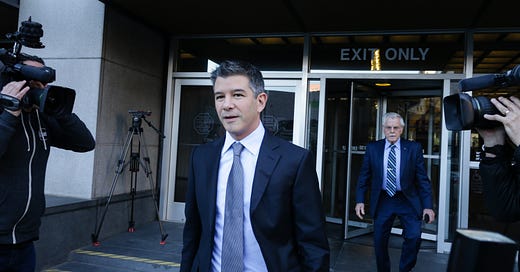Hello and welcome to Oversharing, a newsletter about the sharing economy. If you’re returning from last time, thanks! If you’re new, nice to have you!
In case you missed it: I’ll be in SF for a few days later this month and am planning a small Oversharing get-together. If you’re interested in joining, please fill out this Google form so I can get a sense of numbers. Thanks to those who already responded and to everyone who sent in venue suggestions, it’s much appreciated 🙏.
Travis 3.0.
It’s shaping up to be a year of comebacks for disgraced tech founders. First Adam Neumann, now Travis Kalanick. The Uber co-founder has “quietly built a large food and convenience goods business across Latin America,” the FT reports. The burgeoning empire began with CloudKitchens, a chain of small ‘dark kitchen’ prep spaces for takeout-only restaurants and food delivery businesses that Kalanick launched a few years ago. The FT reports that some of those CloudKitchen spaces are now doubling as micro-fulfillment centers or ‘dark stores’ for a second business, Pik N’ Pak, which rents out storage space for convenience-store-style goods to instant delivery companies like Rappi and Uber-owned Cornershop.
Here’s more from the FT:
CloudKitchens employs around 500 people in Latin America, running approximately 70 locations, containing 1,800 individual kitchens, across eight countries, according to two former senior employees with direct knowledge of the company’s operations.
Pik N’ Pak uses surplus space in the company’s kitchen facilities — such as in the basement or along corridors — to store convenience goods such as over-the-counter medicines, pet food and sex toys. In promotional material, Pik N’ Pak says it offers retailers access to “millions of customers”.
CloudKitchens has raised $1.75 billion in funding and was valued at $15 billion as of last November, according to VC database PitchBook. Kalanick, who was ousted from Uber as CEO in June 2017, has worked to keep both himself and his latest ventures under the radar. CloudKitchens employees are forbidden from listing the company on their LinkedIn (“stealth startup” is allowed instead) and former employees told the FT that different departments were kept siloed and secret from one another. CloudKitchens has also reportedly imported infamous Uber company principles of the Kalanick era, such as “Always Be Hustlin.”
Back when Kalanick took leave from Uber, as the scandals piled up but before he was pushed out entirely, he told staff that he needed to “work on Travis 2.0 to become the leader that this company needs and you deserve.” If Travis 1.0 was the smartest bro in the room, always hustlin’ and toe-stepping, Travis 2.0 was supposed to be the thoughtful, measured, mature leader that Uber needed to move into its next phase as a profitable, law-abiding public company. Except like vaporware, Travis 2.0 was never released because the board ejected him and hired Dara Khosrowshahi instead. What should we expect from Travis 3.0, who is evidently still hustlin’ but has a new business and a new start and certainly must have learned something from his ordeal at Uber?
“The only thing that Travis learned about his time with Uber is not to trust the press, and not to trust venture capitalists,” one former senior figure at the company said.
Jk, sounds like Travis 1.0 never left.
Tipping fatigue.
Americans are tired of tipping, especially on takeaway. While tipping 20% is still the standard for a sit-down meal in a restaurant, “off-premise” tips on delivery and takeout fell to 14.5% in the latest quarter, down from 15-16% over the first few years of the pandemic, according to data from digital payments platform Toast. While it’s perfectly understandable that people don’t want to pay an extra 20% on a sandwich or a coffee and doughnut that they spend 5 minutes purchasing and then carry out, the problem remains that most service industry workers in the U.S. earn a tipped minimum wage, a ruthlessly American policy that allows employers to pay as little as $2.13 an hour toward employee wages—an amount that hasn’t changed since 1991—and rely on customer tips to cover the rest. Technically, employers are required to kick in more if workers don’t earn enough in tips to reach the federal minimum wage ($7.25 per hour) or whatever the local wage floor is, but this rule is difficult to enforce and often violated by employers.
Tipping, like so much of American culture, is rooted in slavery and racism. It was popularized after the Civil War as a way for employers to avoid paying formerly enslaved workers a real wage. These disparities persist today. Tipped workers are more likely to live in poverty and be on food stamps, as well as to be harassed at work. The modern tipped workforce is nearly 70% female and disproportionately Black and brown women, who typically receive smaller tips than their white male colleagues, perpetuating both racial and gender inequalities. At the height of the pandemic, more than 40% of workers surveyed across five states reported an increase in unwanted sexual attention from customers, and an alarming number of female service workers said they were asked by men to take off their masks so the men could judge their appearance and thus determine how much they wanted to tip.
While the tipped minimum wage is the norm for this kind of work, a handful of U.S. states, including Alaska, California, and Minnesota, require employers to pay the full state minimum before tips, and others are looking to abolish the subminimum standard. Just last week, a D.C. court said a ballot initiative to eliminate the tipped wage in D.C. can move forward for November; Portland, Maine, has also advanced a series of ballot measures that would eliminate the subminimum wage as well as phase in an $18 wage floor for all workers, including those not currently covered by minimum wage protections, such as ride-hail drivers, delivery couriers, and other gig workers.
Reclaimed streets.
Salt Lake City mayor Erin Mendenhall is looking to permanently close part of downtown to cars, following the success of the city’s Open Streets program on summer weekends. Mendenhall says Open Streets, which blocked off a section of Main Street, increasing space for pedestrians and allowing restaurants and local businesses to expand onto the sidewalk, has been “a success not only from a business perspective, but also for community rebuilding and a revitalization of our downtown.” By contrast, other U.S. cities that launched some sort of liveable streets program during covid, like Oakland and Berkeley, California, have since wound those down. In New York City, the Open Streets program was made permanent in 2021 but many sites have struggled in the absence of support from the city, and a program that once spanned 83 miles of streets has now dwindled to just over 20.
Elsewhere in Salt Lake City, which appears to be trying to rival Denver with its people-friendly planning initiatives, the city council is close to approving a $4 million infrastructure project that would add new pedestrian crosswalks, extend curbs, and install protected bike lanes. Salt Lake City has famously wide streets, which can seem hostile to pedestrians and other non-car travelers, but which also give the city a lot of room to work with when it comes to redesigning the public domain. Taylor Anderson, co-founder at nonprofit Sweet Streets, told the local public radio station that the city could re-stripe downtown streets without any major impacts on traffic or congestion. “It would just open up more opportunities for people to travel,” he said. “The city and the public need to just open their eyes to see what is possible with paint.”
Name game.
Team M has a cool new resource they’re calling the Micromobility Landscape, with more than 1,000 companies sorted into categories like ‘smart cities,’ ‘shared mobility,’ and ‘last-mile delivery,’ plus sub-categories like ‘bikes’ and ‘operators.’ I briefly flipped though the last-mile delivery category and it further confirmed to me that companies in the instant delivery space are engaged in some sort of meta competition to see who can come up with the most unfortunate name. Strong contenders include Jokr, Gopuff, Fridge No More (RIP), Weezy, Dunzo, and Bother.
Paid posts.
Other stuff.
The E-bike Is a Monstrosity. The E-Bike Is Pure Joy. Paris starts charging for motorbike parking, not electric two-wheelers. Uber is recruiting users in its congestion pricing fight. Transit data startup Populus raises $11 million for smart curb management. SparkCharge gets $23 million for on-demand EV charging. Lime deploys parking wardens in London. Turkish mobility app Marti to go public via spac. As Ex-Uber Executive Heads to Trial, the Security Community Reels. Gig Workers Tire of Waiting for Action From Biden’s White House. Uber grew impatient with delays in Toronto training courses as its drivers quit, emails show. Dangerous e-bike chargers found on Amazon and eBay. Electric batteries are fueling the shift from petrol-powered bikes in Kenya. Moove strikes Uber deal to finance EVs for London drivers. Lyft sued by drivers, passengers claiming company failing to protect users from assault. Waymo opens up robotaxi service to approved Phoenix locals. GM’s Cruise recalls software in 80 robotaxis after June crash. In leaked memo, Aurora CEO weighs spinouts, layoffs and acquisitions against sale to big tech. Self-driving Lyft rides coming soon to Austin. Intercity bus lines begin trying out electric buses. High-Income Consumers More Likely to Be Grocery Super Shoppers. Divert raises $100 million for food waste prevention tech. California Senate approves fast food labor council with power to set wages. “New York is a city made of rats, by rats, for rats.” The Queen is renting a property on Airbnb.
Thanks for subscribing to Oversharing! If you’re enjoying this newsletter and you made it this far, please hit the little heart button under the headline or down here, it’s a free way to help support my work.






